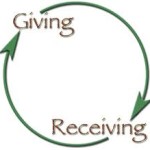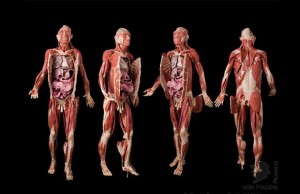This week I traveled to London for an interview. The lovely team that I work with have nominated me for the HSJ Clinical Leader of the Year award. Unbeknownst to me, this meant presenting myself before a panel of experts and leaders in the field of healthcare to talk about the work we have been doing. It was a privilege to get to do this. One of the questions gave me an opportunity to explore with them what I have learnt that has the capacity to bring transformational change….another was about the nature of leadership (which I will blog on next time).
So, for what it’s worth, here are the 3 key things which I consider to be vital to unlock the future of sustainable healthcare, just in case they are helpful!
- Culture Change
Much has been written in the press (and quite rightly so) over the last few years about some of the toxic culture that is at work in the NHS. Sometimes the toxicity is to do with power plays, competition, hierarchy, bullying, low morale and substandard care. But in other cases it is to do with a lack of compassion and care towards those who work in the system which causes the other negative behaviours or leads on to emotion fatigue and poor delivery of service.
When I moved into my role as “lead clinical commissioner of maternity services” (we love long titles in the health service!), three and a half years ago, it was just as Sir Bill Kirkup was publishing his report into the University Hospital of Morecambe Bay. It highlighted the failings we had in our maternity and neonatal services that had lead to some extremely sad and unnecessary losses of life. It targeted the negative culture within our teams and directly challenged some of the behaviours. Morale was understandably at an all time low. But there has been a significant change in culture over the last few years. Cultural shift is absolutely possible but involves a willingness to look stupid at times, to persevere when things feel awkward and remain hopeful when the task seems impossible. I believe the secret lies in rehumanising team meetings, connecting at a relational level, being vulnerable with each other, learning from mistakes, challenging unacceptable practice but creating an atmosphere of grace in which people can reflect, learn, grow, develop, change and discover each other with a deeper understanding and eyes that choose to look with kindness. I refuse to start any of the team meetings I chair without checking how people are doing, giving them space to tell a bit of their story. I want to give space for people to encourage each other, say what they love about each other and what they most appreciate about one another’s work. It’s not rocket science. It’s called connection and compassion! I’ve seen it work here in maternity teams, in our health and wellbeing teams and it really can happen anywhere. Without giving it space and time, nothing will change. But where there is a real sense of togetherness and hope, many more things become possible.
2. Community Partnership
Part of our problem in healthcare is our level of expertise. We know far too much. We “know” what’s good for people. We “know” what people and communities need. We “know” what will make them better. BUT we have not yet really learned to LISTEN. I have found it to be a very humbling and necessary experience to shut my mouth, quieten my need to fix and really listen to the people and communities I am looking to serve and live amongst. When our team hosts conversations to listen to people here around their dreams for this area in terms of health and wellbeing, they don’t talk about extra appointments at weekends or shorter waiting times. They talk about dog poo, safe playing spaces for kids, singing, looking after elderly neighbours, help with exercise and eating well, safe places for people with mental health problems to get together and be understood and many other things. I have found that listening builds partnerships. It creates trust. It means that with our communities, we can co-commission things, and we can do things together rather than the experts doing things to them.
If we are going to see the social movement we need around health and wellbeing in this country, we are going to have to let go of some of our “knowing” and be humble enough to learn. We are going to need to partner with people and not do things to them. We are going to need to focus more on prevention than treatment. We are going to need to work differently. Without the vital engagement and listening with and to our communities, we will never achieve the holy grail of a sustainable health service that remains free for everybody. Together, many things become more possible, and we can learn to live in peace.
3. Collaboration
Every organisation is strapped for cash. It doesn’t need to be this way, but it is the reality of our current economic model. Collaboration and the sharing of resources between partners and organisations is the only way forward. I love sitting in team meetings that involve healthcare – in its different guises – primary, secondary and community services, with social care, the police, the fire service, mental health teams, the voluntary sector, the faith sector, the city and county councils. Creating new cultures, letting down barriers, discovering shared vision, pooling ideas and resources – seriously good for the soul and definitely the future we are looking for.


![1973049_861ba277[1]](http://reimagininghealth.com/wp-content/uploads/2016/03/1973049_861ba2771.jpg)
 This situation exposes something far deeper than just an argument between Jeremy Hunt and the BMA and is far more important than discovering who has the strongest will power. Infact, the BMA have made a major error in targeting Jeremy Hunt so vindictively, because in the final analysis, this isn’t about Hunt at all. Jeremy Hunt can be replaced in a moment, and is likely to be succeeded by a far more robust
This situation exposes something far deeper than just an argument between Jeremy Hunt and the BMA and is far more important than discovering who has the strongest will power. Infact, the BMA have made a major error in targeting Jeremy Hunt so vindictively, because in the final analysis, this isn’t about Hunt at all. Jeremy Hunt can be replaced in a moment, and is likely to be succeeded by a far more robust 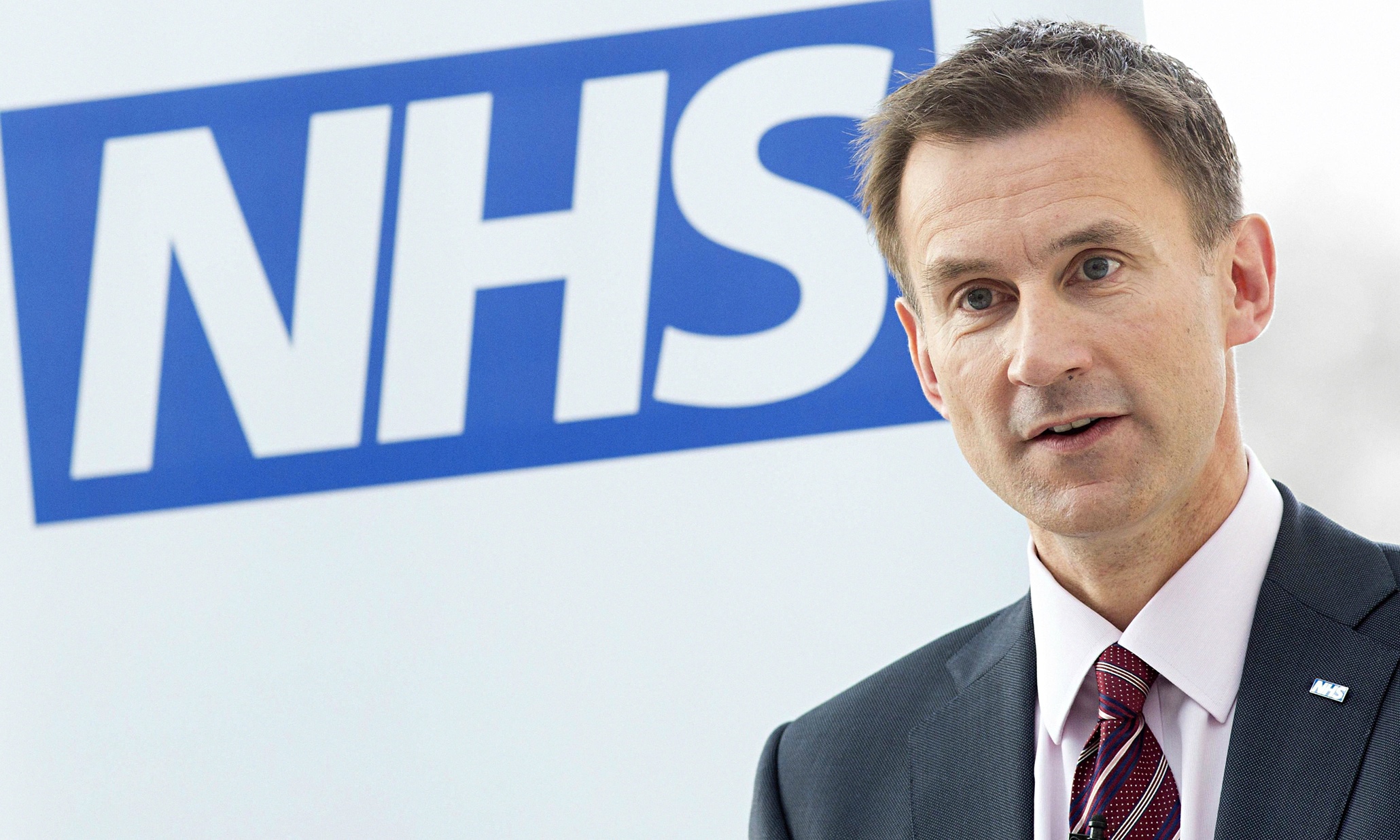 Boris Johnson, who will simply pound his fist more visciously. To make Hunt the scape goat narrows this debate to something far too insignificant and actually strengthens the government’s ability to do exactly as they please.
Boris Johnson, who will simply pound his fist more visciously. To make Hunt the scape goat narrows this debate to something far too insignificant and actually strengthens the government’s ability to do exactly as they please. place, the goverment could instead have said to all the hospital trusts across the country what their hopes and intentions were and then waited to see if this was workable, in what way and how much it would cost. But you cannot simply act like Pharoah and expect the brick makers to make ever more bricks with less and less resource available – otherwise, you face an exodus!
place, the goverment could instead have said to all the hospital trusts across the country what their hopes and intentions were and then waited to see if this was workable, in what way and how much it would cost. But you cannot simply act like Pharoah and expect the brick makers to make ever more bricks with less and less resource available – otherwise, you face an exodus!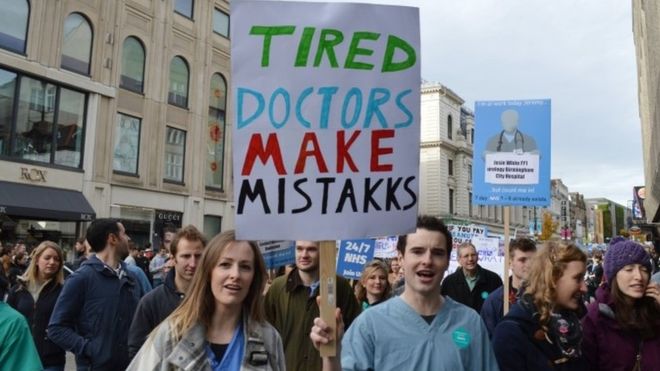 The system, to which we must all bow doesn’t care for the needs of the people who work within it. It will force them to submit. Why should doctors (many of whom work for less than the minimum wage, when on call) be allowed time to rest at weekends? Why can’t everybody have routine care through the weekend, just as from monday to friday (even though most of our top clinicians think we need better emergency care and not routine access)? Surely our economy needs this kind of health service? And actually, whilst we’re on it, isn’t it a waste of time, allowing teachers to have weekends off as well? Don’t we need our children to work harder, or at least be given some sort of babysitting service, so we can get more for our pound of flesh from their parents? If we are to have a 24/7 health service, why not a 24/7 education service? Our shops are already open practically 24/7. In this commercial world – shouldn’t everything else follow suit? No, no and NO!!
The system, to which we must all bow doesn’t care for the needs of the people who work within it. It will force them to submit. Why should doctors (many of whom work for less than the minimum wage, when on call) be allowed time to rest at weekends? Why can’t everybody have routine care through the weekend, just as from monday to friday (even though most of our top clinicians think we need better emergency care and not routine access)? Surely our economy needs this kind of health service? And actually, whilst we’re on it, isn’t it a waste of time, allowing teachers to have weekends off as well? Don’t we need our children to work harder, or at least be given some sort of babysitting service, so we can get more for our pound of flesh from their parents? If we are to have a 24/7 health service, why not a 24/7 education service? Our shops are already open practically 24/7. In this commercial world – shouldn’t everything else follow suit? No, no and NO!!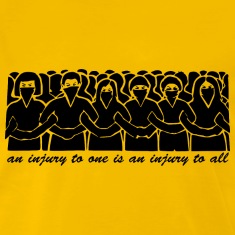 This is why we need a revolution of solidarity and resistance. We need a people movement who will stand together and be brave enough to say that there is a different way to see the world and a new way to live within it. Our naked life itself, although currently abused, can become for us our greatest power. Our naked life can expose the truth of just how abusive our systems have become. Our naked life, when combined with the indestructable force of kenotic love, becomes the very agent of change that we need.
This is why we need a revolution of solidarity and resistance. We need a people movement who will stand together and be brave enough to say that there is a different way to see the world and a new way to live within it. Our naked life itself, although currently abused, can become for us our greatest power. Our naked life can expose the truth of just how abusive our systems have become. Our naked life, when combined with the indestructable force of kenotic love, becomes the very agent of change that we need. really demonstrate the power of naked life……how about naked marches?!! (I grew up in Coventry, and so the story of Lady Godiva is in my blood – nakedness overcame oppression once before!). Or maybe the staff of the NHS should all turn up to work with no clothes on?!! How about people stripping off at least to their underwear to expose both the fragility and the power of naked life?!
really demonstrate the power of naked life……how about naked marches?!! (I grew up in Coventry, and so the story of Lady Godiva is in my blood – nakedness overcame oppression once before!). Or maybe the staff of the NHS should all turn up to work with no clothes on?!! How about people stripping off at least to their underwear to expose both the fragility and the power of naked life?! He comes to be with us and changes himself in the process. He becomes utterly human, not some weird, ready-break glowing child, but deeply human and in so doing destroys the stories we have told ourselves about what he is like. He comes to us. He comes right to our very situations, our joys, or triumphs, our brokenness and our shame and says, I AM with you. And if you run away, I’m there with you. And if you turn away, I’m there with you. And if you hide away, I’m there with you. And if you fail, I’m there with you. And if you don’t believe, I’m there with you in your unbelief. Because contrary to the caricature of Dawkins, I am love itself. A love that will pour itself out time and again. A love that is stronger than bitterness, hate and division. A love that is willing to be misunderstood, misinterpreted and misrepresented. This is not the story of a God who slaughters his enemies in order to protect himself and those he holds close (a narrative upon which the nation state is built and uses to predicate the violence it does to others – and if you don’t believe me, then you haven’t read enough history). No, this is a story about a love that will lay its own life down for its enemies and enables us to do the same.
He comes to be with us and changes himself in the process. He becomes utterly human, not some weird, ready-break glowing child, but deeply human and in so doing destroys the stories we have told ourselves about what he is like. He comes to us. He comes right to our very situations, our joys, or triumphs, our brokenness and our shame and says, I AM with you. And if you run away, I’m there with you. And if you turn away, I’m there with you. And if you hide away, I’m there with you. And if you fail, I’m there with you. And if you don’t believe, I’m there with you in your unbelief. Because contrary to the caricature of Dawkins, I am love itself. A love that will pour itself out time and again. A love that is stronger than bitterness, hate and division. A love that is willing to be misunderstood, misinterpreted and misrepresented. This is not the story of a God who slaughters his enemies in order to protect himself and those he holds close (a narrative upon which the nation state is built and uses to predicate the violence it does to others – and if you don’t believe me, then you haven’t read enough history). No, this is a story about a love that will lay its own life down for its enemies and enables us to do the same.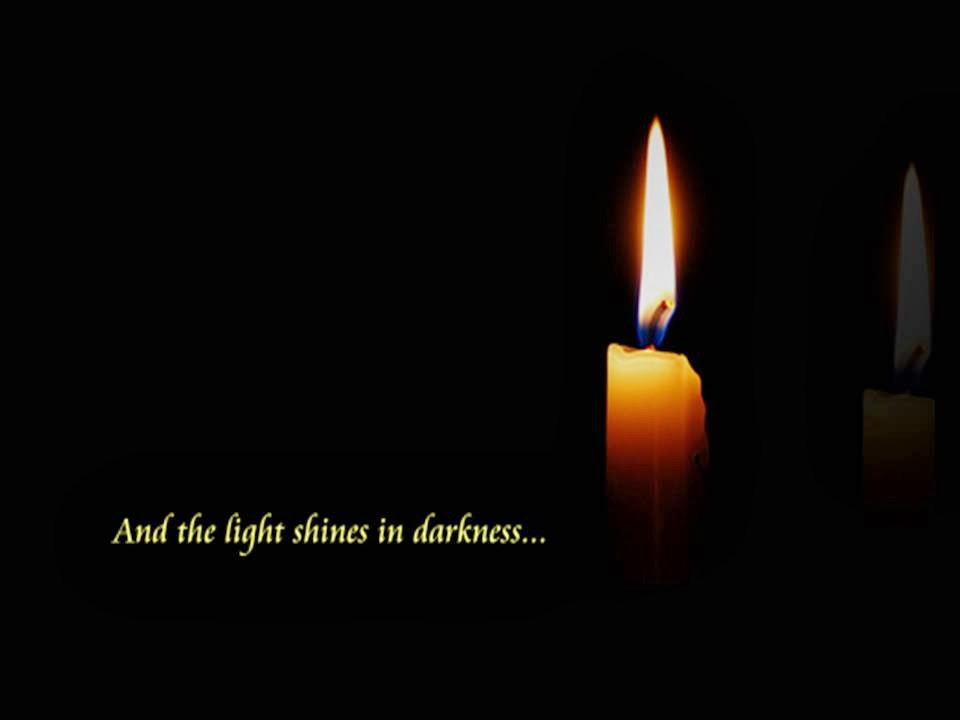 or overcome this light. The promise of the light is peace. Peace on earth. If we embrace the way of love, anything is possible. Even in the midst of all the turmoil in our world this Christmas, I find great hope in the idea of God, who is love, with us in it all. I believe that when we embrace this light and this love as our meta-narrative, as our raison d’être, we find healing for ourselves individually and corporately.
or overcome this light. The promise of the light is peace. Peace on earth. If we embrace the way of love, anything is possible. Even in the midst of all the turmoil in our world this Christmas, I find great hope in the idea of God, who is love, with us in it all. I believe that when we embrace this light and this love as our meta-narrative, as our raison d’être, we find healing for ourselves individually and corporately. ther. For example, physical pain caused to you by another person, may cause you to feel emotionally hurt also (soul pain) and crush your spirit. Or indeed, as I see many times in my work, emotional pain leads to a resentment, which causes a bitterness which manifests itself in a physical pain and so too your spirit is negatively affected.
ther. For example, physical pain caused to you by another person, may cause you to feel emotionally hurt also (soul pain) and crush your spirit. Or indeed, as I see many times in my work, emotional pain leads to a resentment, which causes a bitterness which manifests itself in a physical pain and so too your spirit is negatively affected. “perfect health” may not be possible. But alignment is possible and it is this that gives us a sense of well-being. So, how well are you? Do you know how much you are influenced by the corporate body and soul? What are your meta-narratives? How aligned are you? There are things we cannot change, but we can chose how we respond to them and the choices we make within them. I want to unpack this a bit more in subsequent posts, but this might just kick off some musings.
“perfect health” may not be possible. But alignment is possible and it is this that gives us a sense of well-being. So, how well are you? Do you know how much you are influenced by the corporate body and soul? What are your meta-narratives? How aligned are you? There are things we cannot change, but we can chose how we respond to them and the choices we make within them. I want to unpack this a bit more in subsequent posts, but this might just kick off some musings. roducers (Sugarhouse uk) who generously offered to record the track for free. The amazing charity that is World Vision then heard it and it was agreed that we would release this single as a way of raising money (100% of all the money from singles sold will go to World Vision) for Syrian Refugees this Christmas.
roducers (Sugarhouse uk) who generously offered to record the track for free. The amazing charity that is World Vision then heard it and it was agreed that we would release this single as a way of raising money (100% of all the money from singles sold will go to World Vision) for Syrian Refugees this Christmas.


